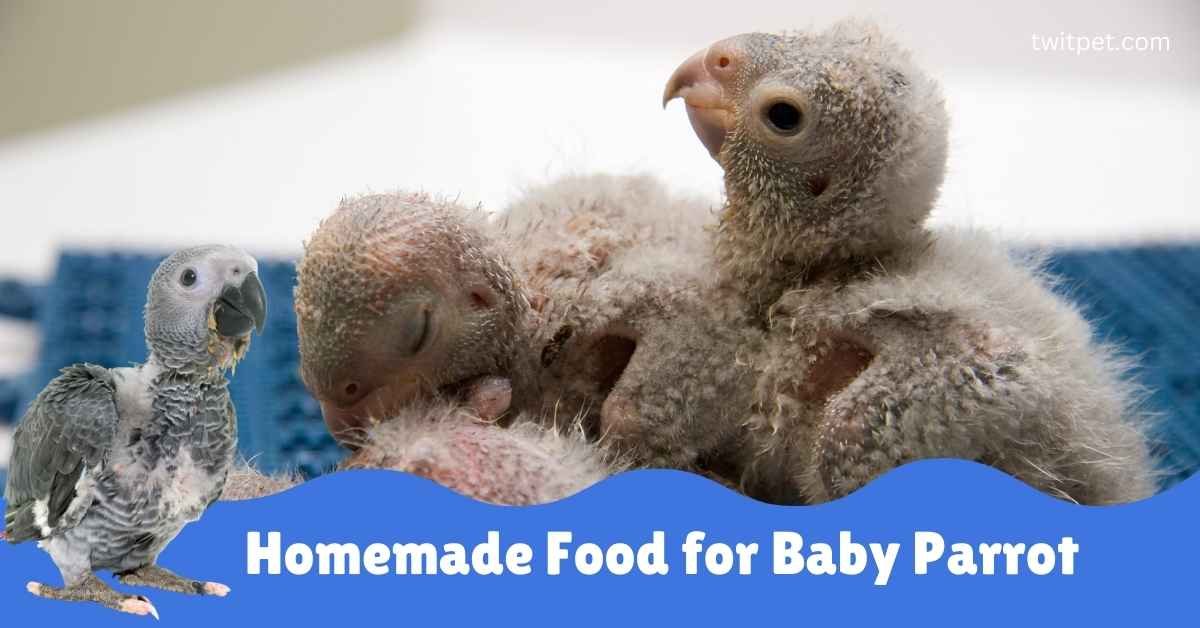Creating homemade food for baby parrots is not only rewarding but also ensures that your feathered friend receives a well-balanced diet tailored to their specific needs. Baby parrots require a diet rich in nutrients to support their rapid growth and development. By preparing their meals at home, you have full control over the ingredients, ensuring that they receive the best possible nutrition.
Why Homemade Food is Essential for Baby Parrots
Homemade food allows you to avoid the additives and fillers often found in commercial parrot food. Instead, you can focus on providing a diet rich in fresh, natural ingredients. This approach not only promotes better health but also helps establish a strong bond between you and your baby parrot. Feeding them food that you’ve prepared yourself can enhance their trust in you, creating a stronger connection.
| Features | Details |
|---|---|
| Nutritional Control | Full control over the ingredients and nutritional content of your parrot’s food. |
| Fresh Ingredients | Use of fresh, organic ingredients to avoid harmful pesticides and preservatives. |
| Customization | Ability to tailor the diet to your parrot’s specific nutritional needs and preferences. |
| Bonding Opportunity | Preparing food at home strengthens the bond between you and your parrot, creating a sense of trust and security. |
| Avoidance of Additives | Eliminates the risk of feeding your parrot harmful additives, preservatives, or artificial colors. |
Selecting the Right Ingredients for Homemade Parrot Food
Choosing the right ingredients is crucial when preparing homemade food for baby parrots. A balanced diet for baby parrots should include a mix of fruits, vegetables, grains, and proteins. Here’s a breakdown of essential ingredients:
- Fruits and Vegetables
- Fruits: Apples, bananas, papaya, mango, and berries are excellent choices. These fruits are rich in vitamins and minerals necessary for your parrot’s development.
- Vegetables: Opt for carrots, sweet potatoes, peas, and bell peppers. These vegetables provide essential nutrients such as beta-carotene, which is vital for healthy skin and feathers.
- Grains and Legumes
- Grains: Rice, quinoa, and amaranth are great sources of carbohydrates and provide energy for your growing parrot.
- Legumes: Lentils, chickpeas, and mung beans are high in protein and fiber, supporting muscle development and digestion.
- Nuts and Seeds
- Nuts: Shelled macadamia nuts, cashews, and walnuts are excellent sources of healthy fats and proteins. However, they should be given in moderation due to their high fat content.
- Seeds: While seeds can be part of a parrot’s diet, they should not be the main component, especially for baby parrots, as they are low in certain essential nutrients.
Recipes for Homemade Baby Parrot Food
To ensure your baby parrot receives a balanced diet, here are three simple yet nutritious recipes:
Fresh Fruit and Vegetable Mix
- Ingredients: Apples, bananas, carrots, bell peppers.
- Instructions: Wash and chop the fruits and vegetables into small, manageable pieces. Blend them until smooth for younger parrots, or leave them slightly chunky for older chicks. Store in an airtight container in the refrigerator for up to three days.
Cooked Grains and Legumes Blend
- Ingredients: Quinoa, brown rice, lentils, chickpeas.
- Instructions: Cook the grains and legumes according to the package instructions. Mix them and let them cool before serving. This blend can be refrigerated for up to five days.
Protein-Rich Blend with Lean Meats
- Ingredients: Cooked chicken breast, mashed sweet potatoes, peas.
- Instructions: Cook and shred the chicken breast. Mix with mashed sweet potatoes and peas. This meal provides a good balance of protein, carbohydrates, and essential vitamins.
Gradual Weaning and Transitioning to Homemade Food
When transitioning your baby parrot from a commercial diet to homemade food, do so gradually. This allows their digestive system to adjust and reduces the risk of digestive upset. Start by mixing small amounts of homemade food with their regular diet, gradually increasing the proportion of homemade food over time.
Important Considerations in Feeding Baby Parrots
Gradual Introduction of Solid Foods When weaning baby parrots off a liquid diet, it’s important to introduce solid foods gradually. Start with soft, easily digestible foods like mashed fruits and vegetables. Over time, more variety and textures should be incorporated to encourage independent eating.
Monitoring Nutritional Intake: Keep a close eye on your parrot’s growth and development. Regularly check their weight, feather condition, and overall behavior to ensure they are thriving on the diet you provide. Adjust their food as needed to meet their changing nutritional needs.
Avoiding Harmful Ingredients
Certain foods are toxic to parrots and should never be included in their diet:
- Chocolate: Contains theobromine, which is harmful to birds.
- Avocado: Contains persin, which can cause respiratory issues and heart failure in parrots.
- Caffeine: Can cause hyperactivity, heart problems, and even death.
- Onions and Garlic Can cause digestive issues and anemia.
- Fruit Seeds: Many fruit seeds contain cyanide, which is toxic to parrots.
Feeding your baby parrot homemade food is one of the best ways to ensure they receive the nutrients they need for healthy growth and development. By carefully selecting ingredients and following proper food preparation techniques, you can provide a balanced diet that supports their well-being. Remember to monitor your parrot’s health and consult with an avian veterinarian if you have any concerns. With the right diet, your baby parrot will grow into a healthy, happy adult bird.
